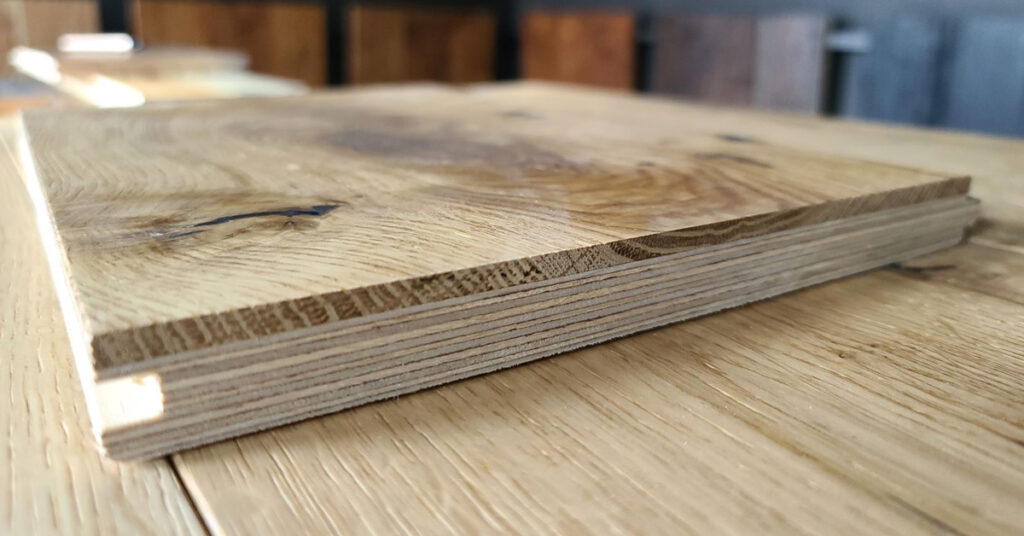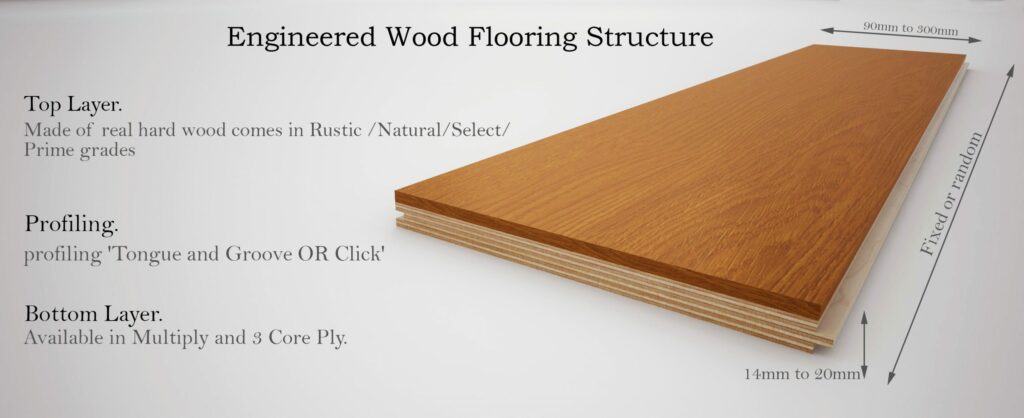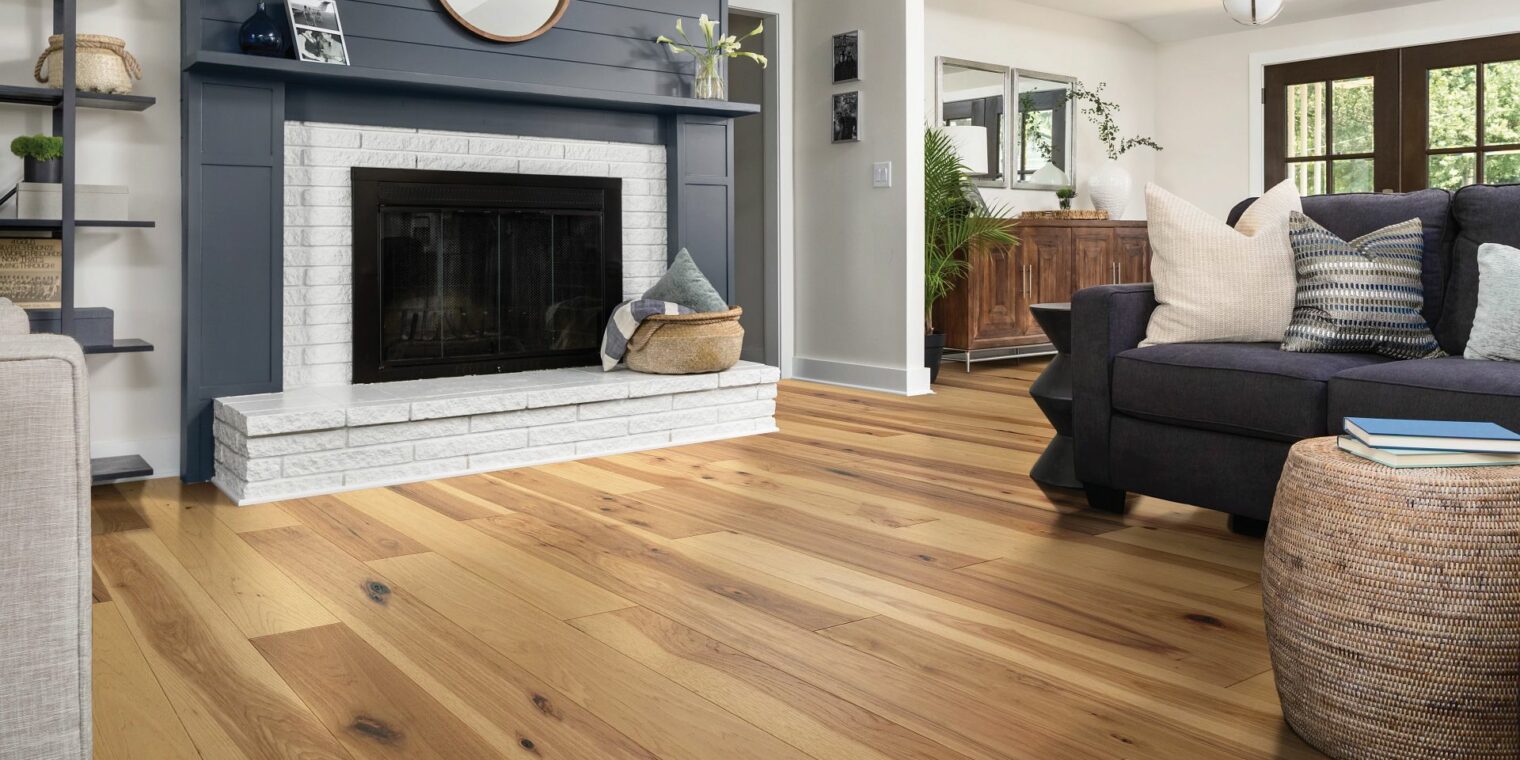Hardwood flooring, composed of solid wood, remains a highly sought-after choice for flooring. Typically crafted from hardwood species such as maple, oak, or walnut, it boasts an impressively extended lifespan, enabling multiple sanding and refinishing processes.
Engineered wood flooring bears a striking resemblance to hardwood flooring at first glance. However, unlike solid wood planks, it is constructed with a top layer of hardwood flooring on a high-quality plywood core. Engineered wood flooring offers a more budget-friendly alternative, although it cannot be refinished to prolong its durability. Both types of flooring are widely utilized throughout homes and offer similar advantages, making the decision a highly subjective one.
Note:
Some contents in this article may contain external links. For more information, please refer to our
Privacy Policy

Key Differences between Hardwood Flooring & Engineered Flooring
Hardwood Flooring:
Solid wood flooring, commonly known as hardwood flooring, is typically crafted from a hardwood species. Maple, walnut, oak, and cherry are among the favored species. The term “solid” refers to the fact that the flooring is made from a single, milled piece of wood. When installing hardwood flooring, the planks are securely nailed to the subfloor, making it a task that demands a certain level of expertise. Due to its composition of solid wood, this type of flooring can be effortlessly sanded and refinished multiple times throughout its lifespan, ensuring its aesthetic appeal endures.
Engineered Wood Flooring:
Engineered wood flooring is designed to mimic the look and texture of hardwood flooring. However, its construction differs as it consists of a thin layer of hardwood on top of a plywood core. The installation process for engineered flooring is user-friendly and offers options such as glued or interlocking planks, making it simpler to install. While the top layer of hardwood is not as thick as solid flooring, it can still endure for over 30 years with appropriate upkeep, although it may not be refinished as frequently.
Key Differences:
| DIFFERENCE IN… | HARDWOOD FLOORING | ENGINEERED WOOD FLOORING |
|---|---|---|
| Cost | Between $8 and $15 per square foot | Between $4 to $7 per square foot |
| Lifespan | Between 30 to 100 years | Up to 30 years or more |
| Materials | 100% Hardwood | Plywood core bonded to a thin hardwood layer |
| Moisture | Water-resistant, but not waterproof | More water-resistant than hardwood, but not waterproof |
| Core | Hardwood | Plywood |
| Cleaning | Do not use a wet mop | Wet mop allowed |
| Sizes | Thickness: about 3/4 inch,
width: 2 1/4 to 4 inches, length: 12 to 84 inches |
Thickness: 3/8 to 9/16 inch,
width: 2 1/4 to 7 inches, length: 12 to 60 inches |

Which Flooring Is Best?
Appearance and Comfort
Hardwood Flooring:
Hardwood flooring planks come in different widths, spanning from 8 inches to 12 inches wide. After installation, solid flooring typically exhibits narrower gaps between the boards. It is offered in a diverse selection of colors and species, both in pre-finished and unfinished panels, allowing for greater customization.
Engineered Wood Flooring
Engineered wood flooring closely resembles hardwood in appearance, but it provides greater versatility in terms of width. Once installed, it can be easily mistaken for solid wood due to its veneer layer. Typically, engineered wood flooring is sold prefinished, and it offers a narrower range of choices in terms of colors and styles compared to hardwood.
Maintenance and Care
Hardwood Flooring
Solid hardwood is quite simple to keep clean and well-maintained. The majority of floors merely require regular sweeping and vacuuming, along with occasional mopping using a specialized wood cleaner to address any stains. It is important to refrain from using water or steam when cleaning wood floors.
Nevertheless, hardwood flooring proves to be more advantageous in terms of long-term upkeep as it can undergo multiple sanding and refinishing processes throughout its lifespan, resulting in a rejuvenated appearance akin to its initial state.
Engineered Wood Flooring
Similar to solid hardwood flooring, engineered wood flooring requires regular sweeping and vacuuming to maintain its cleanliness. To prevent stains and rejuvenate the surface, it is recommended to occasionally mop it with a wood cleaner. However, it is important to note that unlike solid hardwood floors, most engineered wood floors have a thinner top layer of hardwood and cannot be sanded and refinished multiple times. Typically, they can only be refinished once or twice before the hardwood layer is worn out and requires plank repairs.
Lifespan
Hardwood Flooring
Hardwood flooring has a significantly longer lifespan than most types of floorings available. Hardwood flooring can last anywhere between 30 to 100 years with the proper maintenance and care. This is why we still see some houses with hardwood floors from the 1850s.
Engineered Wood Flooring
Even though engineered wood flooring may not be able to undergo refinishing as frequently as solid hardwood, it has the potential to endure for over 30 years or even longer with appropriate upkeep. While the entire floor cannot be sanded and refinished, one advantage of engineered wood flooring planks is their ease of replacement, particularly those that are installed using the click-and-lock technique.
Sizes
Hardwood Flooring
The typical dimensions for hardwood flooring planks are 3/4 inch in thickness, 2 1/4 inches in width, and can range in length from 12 to 84 inches. While there are alternative widths and thicknesses available, it is uncommon for hardwood flooring planks to exceed four inches in width.
Engineered Wood Flooring
Engineered wood flooring planks are typically thinner than hardwood flooring planks, at about 3/8- to 9/16 inches thick. However, it’s usually sold in planks that are much wider, reaching up to seven inches in width, and they can range in length from 12 to 60 inches.
Cost
Hardwood Flooring
Hardwood flooring is considered one of the pricier options among the various types of flooring available in the market. The cost of prefinished hardwood flooring can be as high as $8 per square foot. Typically, hardwood flooring is priced between $8 and $15 per square foot.
Engineered Wood Flooring
In contrast, engineered wood flooring presents a more economical choice for your flooring needs. The price range for engineered wood floors varies from $2.50 to $10 per square foot. However, the majority of styles can be found within the $4 to $7 per square foot range.
For further assistance on how to the different types of Hardwood Flooring or Engineered Wood Flooring, or general questions regarding flooring, our team of flooring experts is readily available to address your inquiries and provide tailored recommendations to meet your specific requirements. Give a call at 623-305-4390 or click here.
Share This Article

